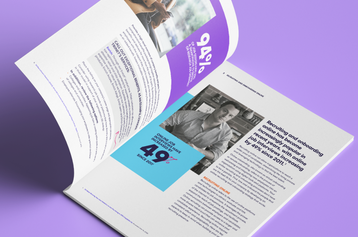Insights on How to Mentor an Employee: Tips, Best Practices, and FAQs

Table of contents
- 1.Skills and tools needed to mentor
- 2.Training
- 3.Commitment
- 4.Active listening
- 5.Constructive criticism
- 6.Empathy and trust
- 7.Being a role model
- 8.Best practices to establish a successful mentoring relationship
- 9.Identify the employee's skill set and career path
- 10.Set goals for mentorship
- 11.Set expectations for mentoring sessions
- 12.Monitoring and assessing
- 13.Feedback
- 14.FAQs
- 15.What is virtual mentoring?
- 16.What are some mentoring best practices?
- 17.What is reverse mentoring?
- 18.Maximize the value of mentoring
Mentoring is a developmental relationship in which an experienced individual (the mentor) provides guidance, advice, and support to a less experienced colleague (the mentee). This relationship often extends beyond skill development and can include personal growth, networking, and long-term career planning.
The main goal is to help facilitate the mentee's professional growth and career advancement. However, the relationship also can benefit the mentor by building leadership skills, offering fresh perspectives through reverse learning, and providing a sense of fulfillment.
The business as a whole benefits, too. Mentorship in a professional work setting can boost employee retention, foster skill development, and cultivate a positive company culture of continuous learning and collaboration.
In this article, we'll take a closer look into how to mentor an employee, and what skills and tools you may need to venture into this highly valuable professional relationship.
Skills and tools needed to mentor
A good mentor provides guidance. A great mentor takes a dynamic approach to the process from beginning to end, effectively using their skills, tools and experience.
Training
Even the most exemplary leaders require training to become effective mentors, as the art of mentorship is a distinct skill set that goes beyond general leadership. Train mentors to approach it as a structured and intentional process. Set clear standards that emphasize active listening, tailored guidance, and mutual respect, all with the overarching goal of fostering individual growth.
Commitment
Great mentors make a commitment to guide, support, and invest time in the mentee's development. This includes offering feedback, sharing experiences, and consistently being available for meaningful conversations. A half-hearted mentoring approach not only diminishes the chances of the mentee's success but also risks eroding trust and undermining the foundational relationship integral to effective mentorship.
Active listening
Active listening involves fully concentrating on and understanding the mentee's verbal and nonverbal messages. Maintain appropriate eye contact, refrain from premature judgment or interruptions, and provide feedback by paraphrasing or summarizing. Asking open-ended questions further enhances the depth and effectiveness of the mentor-mentee dialogue.
Constructive criticism
Constructive criticism involves offering clear, specific, and actionable feedback aimed at helping someone improve certain behaviors or skills. In mentoring, it helps foster growth and guide the mentee towards professional development. To effectively provide constructive criticism, a mentor should:
- Focus on the behavior rather than the person.
- Be specific about areas for improvement.
- Pair critiques with positive feedback or suggested solutions.
Be careful to note the key differences between harmful criticism and constructive criticism. It's mostly in the way you phrase your ideas. Malicious criticism might sound like, "I don't like this press release. Whoever taught you to write like that was out of their mind. Fix it."
Constructive criticism might sound like, "I think this press release is a bit too wordy. I like the tone you used, but I marked some sentences that may need revisions and added some notes."
Empathy and trust
Being a mentor requires trust and openness in different ways:
- Trusting a mentee to make their own decisions. A mentee should be given a certain amount of trust and space to forge their own path, make mistakes as well as achievements, and grow.
- Discussing their own career mistakes. No one knows everything when they're first starting out.
- Sharing networking contacts with the mentee to help the mentee's career growth.
- Admitting when they don't know the answer. Instead of pretending to have all the answers, mentors should be honest when they're unsure about something. This demonstrates humility, sets a good example and encourages a culture of continuous learning.
Being a role model
Actions speak louder than words, right? For workplace mentors, being "role models" means exemplifying the values, behaviors, and skills that are desired and respected within the organization. By embodying these standards, a mentor provides a tangible example for the mentee to emulate. They set a clear benchmark for professional conduct and excellence.
Best practices to establish a successful mentoring relationship
To get the most out of a mentoring program, here are some tips and best practices to get you started.
Identify the employee's skill set and career path
Identifying the employee's skill set and career path is pivotal in understanding the current capabilities of the mentee and the trajectory they aim to follow. This recognition enables the mentor to tailor guidance, resources, and opportunities that align directly with the mentee's aspirations. Targeted mentoring enhances specific skills and guides the mentee more effectively along their professional journey.
Set goals for mentorship
Setting goals for mentorship creates a roadmap, guiding the mentor-mentee relationship towards specific milestones and desired outcomes. By clearly defining these targets, both parties can measure progress, focus efforts on tangible objectives, and make sure that the mentorship yields positive results.
Set expectations for mentoring sessions
Start by developing a schedule of regular meetings and setting an agenda for each one. It doesn't have to be highly detailed or elaborate, just enough structure and information to keep you both on track.
Setting expectations for mentoring sessions helps both parties to form a clear understanding of the objectives and desired outcomes. The guidelines and objectives will help you maintain focus, be more productive, and address the specific needs and aspirations of the mentee.
Monitoring and assessing
No mentorship relationship will be perfect. There will certainly be things you disagree on. As you monitor your relationship, assess what's working and not working. Beyond that, the company is investing resources in this effort. The results need to be measured so the process can be improved and evolve.
Feedback
Give mentees a channel for offering feedback on the program. A mentee should be encouraged to be open about their constructive feedback with their mentor. However, give them an anonymous or indirect way to assess the overall program, too. Ideally, feedback will be gathered during the mentorship and after it has concluded.
FAQs
What is virtual mentoring?
To adapt to the increase in remote workers, companies can employ "virtual mentoring" through structured online platforms and communication tools. This approach might involve pairing mentors and mentees based on profiles and preferences submitted through dedicated software or intranet platforms. These programs often use tools such as:
- Regularly scheduled video calls.
- Collaborative online workspaces.
- Digital goal-tracking tools.
To maintain the personal touch pivotal to mentorship, blend structured digital touchpoints, like webinars and online modules, with open-ended discussions and check-ins. If possible, both parties might be encouraged to have occasional face-to-face meetings. Or team members may participate in virtual group sessions to share experiences and broaden their network.
What are some mentoring best practices?
- Ask lots of questions. Coaching questions are open-ended and meant to facilitate deeper reflection, encourage self-awareness, and guide mentees in their problem-solving and decision-making processes.
- Balance your feedback. Don't exclusively offer constructive criticism, celebrate successes. And provide possible solutions and alternatives when reviewing problems.
- Collaborate. Work together on a project so the mentee can see how you problem-solve. Keep your mind open to the ways that the mentee could provide new ideas.
What is reverse mentoring?
"Reverse mentoring" refers to a relationship where traditionally junior employees mentor senior employees. It's often a means of sharing insights on new technologies, emerging trends, or organizational culture shifts. This approach recognizes that younger or less experienced employees can possess valuable knowledge or perspectives that can benefit those in more senior positions. All companies can benefit from promoting mutual learning and bridging generational or experiential gaps.
Maximize the value of mentoring
Now that you know how to mentor employees, you might be ready to integrate an HR solution to help plan, monitor, and evaluate your company's mentoring relationships.
That's where TriNet can help. TriNet's services, particularly when it comes to performance management, emphasize the pivotal role of mentorship as a tool for nurturing talent, fostering professional growth, and ensuring sustained employee engagement and retention. Talk to a TriNet representative today.
This communication is for informational purposes only, is not legal, tax or accounting advice, and is not an offer to sell, buy or procure insurance.

TriNet Team
Table of contents
- 1.Skills and tools needed to mentor
- 2.Training
- 3.Commitment
- 4.Active listening
- 5.Constructive criticism
- 6.Empathy and trust
- 7.Being a role model
- 8.Best practices to establish a successful mentoring relationship
- 9.Identify the employee's skill set and career path
- 10.Set goals for mentorship
- 11.Set expectations for mentoring sessions
- 12.Monitoring and assessing
- 13.Feedback
- 14.FAQs
- 15.What is virtual mentoring?
- 16.What are some mentoring best practices?
- 17.What is reverse mentoring?
- 18.Maximize the value of mentoring






